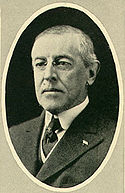
The war to end war
Encyclopedia

World War I
World War I , which was predominantly called the World War or the Great War from its occurrence until 1939, and the First World War or World War I thereafter, was a major war centred in Europe that began on 28 July 1914 and lasted until 11 November 1918...
. Originally idealistic, it is now used mainly in a disparaging way.
Origin
During August 1914, immediately after the outbreak of the war, British author and social commentator H. G. WellsH. G. Wells
Herbert George Wells was an English author, now best known for his work in the science fiction genre. He was also a prolific writer in many other genres, including contemporary novels, history, politics and social commentary, even writing text books and rules for war games...
published a number of articles in the London newspapers which subsequently appeared as a book entitled The War That Will End War. Wells blamed the Central Powers
Central Powers
The Central Powers were one of the two warring factions in World War I , composed of the German Empire, the Austro-Hungarian Empire, the Ottoman Empire, and the Kingdom of Bulgaria...
for the coming of the war, and argued that only the defeat of German militarism could bring about an end to war. Wells used the shorter form, "the war to end war", in In the Fourth Year (1918), where he noted that the phrase had "got into circulation" in the second half of 1914. In fact, it had become one of the most common catchphrases of the war.
In later years, the term became associated with Woodrow Wilson
Woodrow Wilson
Thomas Woodrow Wilson was the 28th President of the United States, from 1913 to 1921. A leader of the Progressive Movement, he served as President of Princeton University from 1902 to 1910, and then as the Governor of New Jersey from 1911 to 1913...
, despite the fact that Wilson only used it once. Along with the phrase "make the world safe for democracy", it embodied Wilson's conviction that America's entry into the war was necessary to preserve human freedom.
Later use
Even during World War I, the phrase met with some degree of skepticism; David Lloyd GeorgeDavid Lloyd George
David Lloyd George, 1st Earl Lloyd-George of Dwyfor OM, PC was a British Liberal politician and statesman...
is reputed to have said, "This war, like the next war, is a war to end war." As it became apparent that the war had not succeeded in ending war, the phrase took on a more cynical tone. Field-Marshal Earl Wavell
Archibald Wavell, 1st Earl Wavell
Field Marshal Archibald Percival Wavell, 1st Earl Wavell GCB, GCSI, GCIE, CMG, MC, PC was a British field marshal and the commander of British Army forces in the Middle East during the Second World War. He led British forces to victory over the Italians, only to be defeated by the German army...
said despondently of the Paris Peace Conference
Paris Peace Conference, 1919
The Paris Peace Conference was the meeting of the Allied victors following the end of World War I to set the peace terms for the defeated Central Powers following the armistices of 1918. It took place in Paris in 1919 and involved diplomats from more than 32 countries and nationalities...
: "After the 'war to end war', they seem to have been pretty successful in Paris at making the 'Peace to end Peace'". Wells himself used the phrase in an ironic way in the novel, The Bulpington of Blup (1932). Walter Lippmann
Walter Lippmann
Walter Lippmann was an American intellectual, writer, reporter, and political commentator famous for being among the first to introduce the concept of Cold War...
wrote in Newsweek
Newsweek
Newsweek is an American weekly news magazine published in New York City. It is distributed throughout the United States and internationally. It is the second-largest news weekly magazine in the U.S., having trailed Time in circulation and advertising revenue for most of its existence...
in 1967, "the delusion is that whatever war we are fighting is the war to end war", while Richard Nixon
Richard Nixon
Richard Milhous Nixon was the 37th President of the United States, serving from 1969 to 1974. The only president to resign the office, Nixon had previously served as a US representative and senator from California and as the 36th Vice President of the United States from 1953 to 1961 under...
, in his Silent Majority speech, said, "I do not tell you that the war in Vietnam is the war to end wars".

